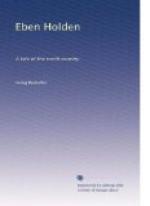He had once been a schoolmaster and that accounted for his didactic style.
‘What are the two great talents of the Yankee?’ he repeated, his hands clasped before him.
‘Doughnuts an’ pie,’ said Uncle Be who sat in a far corner.
‘No sir,’ Mr Walker answered, ‘there’s some hev a talent fer sawin’ wood, but we don’t count that. It’s war an’ speakin’, they are the two great talents of the Yankee. But his greatest talent is the gift o’ gab. Give him a chance t’ talk it over with his enemy an’ he’ll lick ’im without a fight. An’ when his enemy is another Yankee — why, they both git licked, jest as it was in the case of the man thet sold me lightnin’ rods. He was sorry he done it before I got through with him. If we did not encourage this talent in our sons they would be talked to death by our daughters. Ladies and gentlemen, it gives me pleasure t’ say that the best speakers in Faraway township have come here t’ discuss the important question:
’Resolved, that intemperance has caused more misery than war?
‘I call upon Moses Tupper to open for the affirmative.’
Moses, as I have remarked, had a most unlovely face with a thin and bristling growth of whiskers. In giving him features Nature had been generous to a fault. He had a large red nose, and a mouth vastly too big for any proper use. It was a mouth fashioned for odd sayings. He was well to do and boasted often that he was a self-made man. Uncle Be used to say that if Mose Tupper had had the ‘makin’ uv himself he’d oughter done it more careful.’
I remember not much of the speech he made, but the picture of him, as he rose on tiptoe and swung his arms like a man fighting bees, and his drawling tones are as familiar as the things of yesterday.
‘Gentlemen an’ ladies,’ said he presently, ‘let me show you a pictur’. It is the drunkard’s child. It is hungry an’ there ain’t no food in its home. The child is poorer’n a straw-fed hoss. ‘Tain’t hed a thing t’ eat since day before yistiddy. Pictur’ it to yourselves as it comes cryin’ to its mother an’ says:
‘"Ma! Gi’ me a piece o’ bread an’ butter.”
‘She covers her face with her apron an’ says she, “There am none left, my child.”
‘An’ bime bye the child comes agin’ an’ holds up its poor little han’s an’ says: “Ma! please gi’ me a piece O’ cake.”
‘An’ she goes an’ looks out O’ the winder, er mebbe pokes the fire, an’ says: “There am’ none left, my child.”
‘An’ bime bye it comes agin’ an’ it says: “Please gi’ me a little piece O’ pie.”
‘An’ she mebbe flops into a chair an’ says, sobbin’, “There ain’ none left, my child.”
‘No pie! Now, Mr Chairman!’ exclaimed the orator, as he lifted both hands high above his head, ’If this ain’t misery, in God’s name, what is it?




